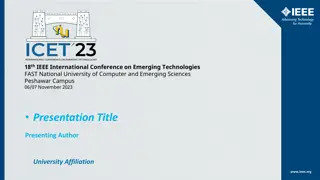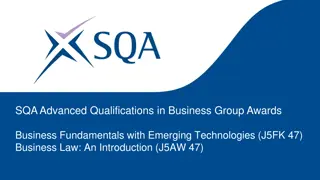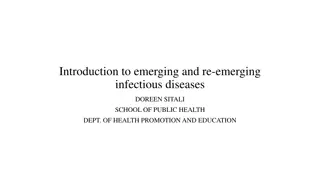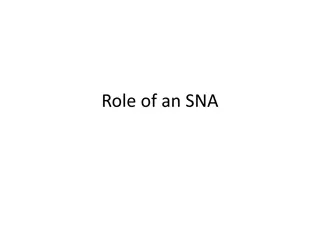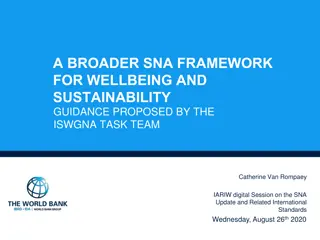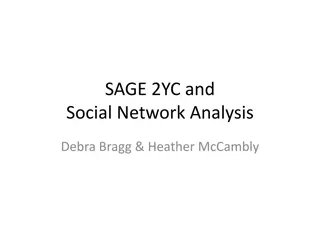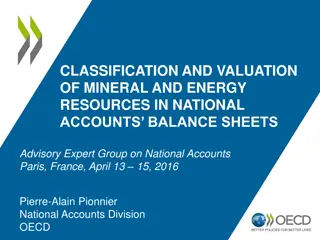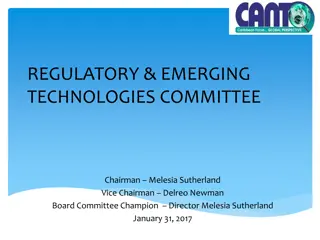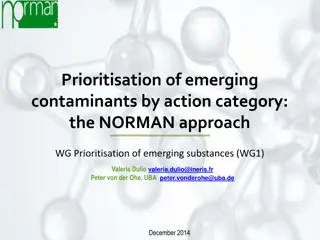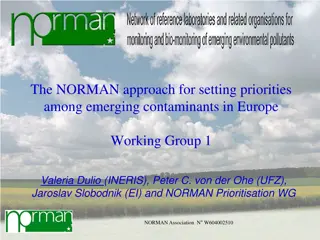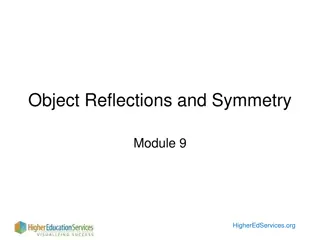Reflections on the Emerging SNA 2025
The update process for the System of National Accounts (SNA) in 2025 involves collaboration with international organizations to ensure consistency and relevance. Key elements include technical research, consultation, and alignment with economic statistics standards. The process includes drafting, consultation, testing, and approval phases, targeting implementation by 2025. Priority areas encompass financial issues, globalization, Islamic finance, digitalization, and sustainability, among others.
Download Presentation

Please find below an Image/Link to download the presentation.
The content on the website is provided AS IS for your information and personal use only. It may not be sold, licensed, or shared on other websites without obtaining consent from the author.If you encounter any issues during the download, it is possible that the publisher has removed the file from their server.
You are allowed to download the files provided on this website for personal or commercial use, subject to the condition that they are used lawfully. All files are the property of their respective owners.
The content on the website is provided AS IS for your information and personal use only. It may not be sold, licensed, or shared on other websites without obtaining consent from the author.
E N D
Presentation Transcript
Reflections on the Emerging SNA 2025 The SNA update: process and scope Catherine van Rompaey Inter-secretariat Working Group on National Accounts (ISWGNA) 38th IARIW General Conference Panel Discussion, Opening Plenary August 27, 2024
UPDATING THE SYSTEM OF NATIONAL ACCOUNTS STANDARDS Governance of the SNA standards Governance of the SNA standards Inter-secretariat Working Group on National Accounts (ISWGNA) Collaborative model with five international organizations: UN, OECD, IMF, Eurostat, World Bank Advisory Expert Group on National Accounts (AEG) Approximately 20 NSO experts, representing different world regions For detailed guidance, chapter drafts and progress, see UN webpage: Towards the 2025 SNA https://unstats.un.org/unsd/nationalaccount/towards2025.asp
UPDATING THE SYSTEM OF NATIONAL ACCOUNTS STANDARDS Key elements of the update approach Key elements of the update approach System of National Accounts statistical standards determine how the economy is defined and measured. Undertaking technical research on prioritized national accounts issues Engaging in a broad consultation on update Must be updated periodically to ensure they reflect the current economic reality. Ensuring overall consistency with other statistical standards in economic statistics Update to current standards well-advanced, targeted to come into effect in 2025. A program of experimentation, testing and advance implementation
The Theprocess process UNSC: adopt 2025 SNA Develop guidance notes, country consultation and testing Draft 2025 SNA, consultation on new text UNSC: launch update process AEG and ISWGNA approval UNSC: adopt recommendations SNA Iterative drafting of updated SNA: 2022 - 2024 Oct 2024 March2025 2024 2020-2023 March2024 March 2020 Common issues BOPCOM: launch update process Draft BPM7, including country consultation on new text BOPCOM: endorse draft outline after public consultation Research work, leading to draft outline BOPCOM and IMF Chief Statistician: approve BPM7 BPM
Joint priority areas BPM priority areas SNA Financial Issues BOP Globalization IPP priority areas Islamic Finance Current Account Informal Economy Digitalization Direct Investment Wellbeing and Sustainability Statistical Units Communication Classifications
UPDATING THE SYSTEM OF NATIONAL ACCOUNTS STANDARDS Scope of new SNA recommendations Scope of new SNA recommendations Conceptual changes Additional tables/statistics Clarification and new guidance
UPDATING THE SYSTEM OF NATIONAL ACCOUNTS STANDARDS Conceptual changes Conceptual changes Data as an asset Natural resource depletion a cost of production like consumption of fixed capital The sum-of-cost approach consistency in application Measuring the output of central banks Renewable energy The split asset approach for natural capital Other changes no impact on key aggregates Biological assets, definition of rent, concessional lending, dividends related to foreign direct investment, work in progress, equity in international organizations, securities provided by central banks as collateral Treating marketing assets as investment originally proposed Not supported in global consultations due to concerns re practical feasibility of measurement Remains on SNA research agenda; work continues with implementation task team
UPDATING THE SYSTEM OF NATIONAL ACCOUNTS STANDARDS Additional statistics Additional statistics Globalization Breakdown of corporations into foreign-controlled, public and national private Extended Supply and Use Tables (SUTs) Special purpose entities Digitalization: Improved visibility of digital economy; digital SUTs Extensions for free digital products Crypto assets Financial risks and vulnerabilities: Non-bank financial intermediation ( Shadow banking ) Financial derivatives Whom-to-whom Other: Concessional loans, reinvested earnings, foreign direct investment, valuation of debt securities, provisions
UPDATING THE SYSTEM OF NATIONAL ACCOUNTS STANDARDS Wellbeing and Sustainability Wellbeing and Sustainability Enhancing and broadening the SNA framework Enhancing and broadening the SNA framework + breakdown in household groups (e.g., income or wealth deciles, household composition) + inclusion of socio-demographic characteristics (e.g., gender, age, education) Capital approach supports compilation of inclusive or comprehensive wealth
UPDATING THE SYSTEM OF NATIONAL ACCOUNTS STANDARDS Current Wellbeing Guidance Current Wellbeing Guidance Labour: Inclusion of new labour tables as standard component to the sequence of accounts Focus on four dimensions: jobs, persons, volume and payments Extension for unpaid household service work Health care: Regular compilation of supplementary information on health care expenditure Breakdowns by function, providers and financing Extension for unpaid household service work Education: Regular compilation of thematic tables on education and training Breakdowns of output and expenditure by purpose, provider and financing Include information on time spent on learning Unpaid household service work: Compile supplementary accounts on unpaid household service work at least every 5 years Extend SUTs in physical units and monetary terms, broken down by type of activity Complementary extensions of GDP and HDI including unpaid household service work Additional information for a complete accounting of time use
UPDATING THE SYSTEM OF NATIONAL ACCOUNTS STANDARDS Future Wellbeing (Sustainability) Guidance Future Wellbeing (Sustainability) Guidance Natural capital: Inclusion of renewable energy resources Improved treatment of biological resources Additional breakdownsfor environment-related assets and flows; better distinguish natural assets A split asset approach when resource rents are split between legal owner and extractor Recording depletion as standard component in the SNA, emphasis on net measures Clarifications on application of net present value (NPV) method for valuing natural resources Recommendations on treatment of emission trading schemes Supplementary information on provisions (e.g., related to terminal costs) Encourage compilation of (SEEA) ecosystem accounts Human capital: Extended tables on human capital according to two valuation approaches (lifetime earnings, cost approach) Social capital: While it is acknowledged that social capital is often referenced in relation to extended wealth measures, not proposed for inclusion due to lack of consensus on definition and valuation
UPDATING THE SYSTEM OF NATIONAL ACCOUNTS STANDARDS Distributions of household income, consumption, Distributions of household income, consumption, saving and wealth saving and wealth Relevant for both current and future well-being (sustainability) Recommend regular compilation of household distributions consistent with national accounts Locally-relevant socio-demographic breakdowns also applied to other topics (unpaid household work, labour statistics)
UPDATING THE SYSTEM OF NATIONAL ACCOUNTS STANDARDS Greater prominence for wellbeing and Greater prominence for wellbeing and sustainability in SNA 2025 manual sustainability in SNA 2025 manual New Chapters Chapter 2: Addresses significance and appropriate scope of well-being and sustainability in the SNA Chapters 34 and 35: detailed specific guidance on well-being and sustainability, respectively Emphasis on tie-ins with the System of Environmental and Economic Accounts (SEEA) as companion standards, harmonized where possible
UPDATING THE SYSTEM OF NATIONAL ACCOUNTS STANDARDS Implementation Challenges Implementation Challenges For many countries wellbeing and sustainability recommendations will imply new investments in source data Priorities set vis- -vis local policy requirements Modular approach Practical guidance needed to assist in implementation Technical assistance/support for countries with limited statistical capacity
UPDATING THE SYSTEM OF NATIONAL ACCOUNTS STANDARDS Context for the United Kingdom Context for the United Kingdom UK has advanced, policy-driven program of measurement beyond GDP serving as an example for other countries Any such program will be specific to local policy priorities and information needs SNA global consultations indicate full suite of wellbeing and sustainability recommendations beyond the capacity of many countries New guidance nonetheless provides needed clarity for broadened economic measurement, drawing on mature frameworks to assure international comparability
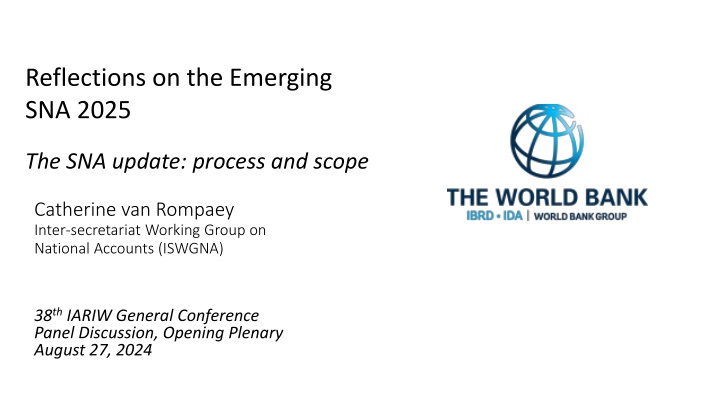

![READ⚡[PDF]✔ Emerging Space Powers: The New Space Programs of Asia, the Middle Ea](/thumb/21554/read-pdf-emerging-space-powers-the-new-space-programs-of-asia-the-middle-ea.jpg)
